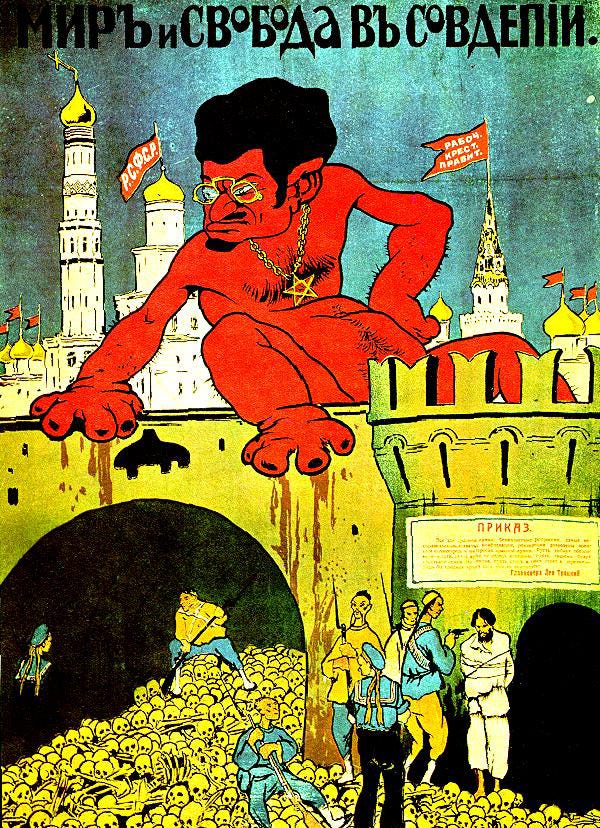Let's Talk About Jews
Critics are calling it a levelheaded, world-uniting, totally uncontroversial, mature exploration into the fascinating world of Zionism, Ashkenazi genetic domination, and racial consciousness
Write & Lift is an ethos of personal and spiritual development through conscious physical exertion and practice of the writing craft. Through this effort to strengthen our bodies and minds, we become anti-fragile and self-respecting sovereign individuals. Through this effort, we may stand against untruth and evil and create a new culture of vitality, strength, and virtue.
If this is your first time reading, subscribe here.
Let’s Talk About Jews
You know you’re wading into “oh shit” territory when one word: Jew, black, trans, etc... promotes a visceral physical and psychological response. Maybe you felt a tinge of excitement when you saw this post. Maybe you felt a little on edge. Maybe you felt nothing and just don’t care (in which case you’ve probably scrolled on and good for you).
Regardless, these feelings point to a collective network of rage and neurosis. If aligning (or refusing to align) to a particular side on a topic threatens friendships, employment, family peace, or followers is it really worth covering? YOU BET YOUR ASS.
I’ll keep the preamble short. If you expect me to align with your beliefs, reflect any kind of “allyship”, dive into details of current conflicts, or condemn an entire group of people, you will be disappointed. Your time is better spent elsewhere.
If you’re curious about my honest reflections and observations on current “Jewish discourse”—the good, the bad, the ugly, and the downright retarded—then grab your Kippah and pour a glass of Manischewitz wine, and let’s get into it.
First, lets take a second and reflect on the impossible. Progressive social justice warriors and far right ethnonationalists both share an equal hatred and suspicion of Jews. I can’t name a single thing both sides have united on besides this one issue. It’s fascinating.
However, despite a shared enmity, both the right and left diverge in their definition and diagnosis of the “Jewish Problem”. Based on my observations, a brief steel-man of each sides position would be thus:
Progressive Social Activists:
Jews (Zionists in this context) represent an aggressive “white” colonial identity focused on displacing and murdering Arab neighbors
Jewish subversion of media/politics/culture is as an impediment for real reform and change. This is even more nefarious given Jewish alignment with progressive positions (when it’s convenient for them).
Right-Wing Ethnonationalists:
Jews (Zionists in this context) have fixed themselves in global positions of power to undermine the interests and demography of European peoples while working to further promote their own ethnic interests.
Jews are natural enemies of Christ. They handed him to the Romans because they saw his teachings as a threat
For the left, conservative Jews and Zionists, represent the tyrannical and malevolent rigid order of the ethnostate. To them, Israel and N*zi Germany are one and the same.
For the right, Jews (broadly) represent a malicious anti-human force of evil that treats non-Jews (Goyim) as mere cattle. To this contingent of the right, H*tler was a hero, acting in self-defense of his people.
I don’t agree with either of these extremes. But any opinion held strongly is liable to have some truth in it. These beliefs don’t happen in a vacuum, and Jews certainly don’t have a monopoly on being hated or doing hateful things. What you’re about to read can be applied to any group, ethnicity, and culture that is bound together by a shared sense of values, heritage, genetics, and political organization.
So why is it that Jews inspire so much hatred, praise, conflict, and attention? Because they are damn good at almost everything they do.
You should be able to recognize a some but not all caveat here and avoid chimping out.
Despite reading multiple books about the history of Zionism and the Middle-East, and watching dozens of hours of interviews with thought leaders from both Jewish and anti-Zionist persuasions, I have still barely scratched the surface.
However, what I can say with certainty, is that Jewish success in banking, business, academics, and politics is a result of three things: an insular network within Jewish families and communities that prioritize financial and academic success, higher-than-average IQ’s (specifically Ashkenazi Jews), and a cultural desire to protect and preserve Jewish cultural tradition and Zionist interests by leveraging influence in positions of power. This latter point is referenced at length in Jewish religious texts as “Tikkun Olam”, Hebrew for “repairing the world”.
All of us have an “in-group” preference. When Chinese people are given the choice between living in a Latino or Chinese community, they choose the Chinese community. This is true across races, ethnic groups, and cultures. Jews are no different. They prefer their own, and protect their own.
What makes Jews a more powerful diaspora than Ukrainians, Tutsi, Armenians, and other persecuted ethnic minorities, is the ability to leverage past injustice. I am not blaming the victim. As I have said previously, this is a strategic decision to benefit the Jewish people and the Zionist project.
When the phrase “Christ is King!” went viral, Jewish journalists, media personalities, and Jewish-funded politicians decried it as an anti-semitic Christian dog whistle. When Elon Musk made a statement on X that Jewish funding of NGO organizations displacing European peoples should be studied, he was dragged on a public apology tour and made to visit the Western Wall. The American Israeli Public Affairs Committee (AIPAC) provides campaign funding to 90% of US Congressional Representatives (this is why every US President is forced to endure a public ritual of Jewish support).
These are all mechanisms of narrative control. Everyone tries to do it, but Jews do it better. Why is that?
You have to look at history. Mutual resentment between Jews and Christians during the Middle Ages allowed Jews to cement themselves in positions of authority outside of established systems.
When the Catholic Church made it a sin for Christians to lend money with interest, Jews—whose religious belief didn’t outlaw usury—stepped in to fill a void. When trade guilds began to exclude non-Christians, Jews moved into academics, business, and banking. When Kings levied special taxes against Jews who practiced usury, they became Lawyers to protect their self-interest. Despite being relegated to the outside of “Christian Society”, Jews learned to exert disproportionate influence as a small minority. Christians, who saw Jews acting against Christian law, ethics, culture, or moral standards, grew resentful, distrustful, and bitter.
This tension continued to simmer, marked by periods of violence. Persecution and expulsion of Jews, known as Pogroms, were common in both Western and Eastern European nations. This eventually led to the political philosophy of Zionism (a zealous ethnonationalist Jewish movement to establish a Jewish homeland in Palestine).
We have been sold a myopic and infantile view of world history that pretends that all conflict is a cycle of domination and oppression. Jews were persecuted, yes. But Jews also worked to undermine European Christendom. Both of these things can be true, and both of them are. If we want to understand modern-day problems, we have to look at the past. If we refuse to, then we’re just making stuff up. For Christians in Europe, Judaism represented a real threat to their values and culture. The inverse was also true. These tensions didn’t arise from nothing.
Richard von Coudenhove-Kalergi, a popular 19th-century Rothschild-funded Austrian intellectual and proponent of a Pan-European identity, spoke openly about Jewish superiority to European Christians. In 1925 he called Jews the “master race” and proposed that European peoples be forced to miscegenate with imported nonwhites to form the “Eurasian-negroid race of the future”.
While making up less than 5% of the 19th-century European population, Jews contributed and helped to organize revolutionary socialist political movements in Germany, Russia, Austria, and Poland.
Outside of a few exceptions (Look at Narodnaya Volya, “The Peoples Will” movement in 19th century Russia) Jews did not resort to terrorism or the mobilization of massive armies. They lacked the numbers to take anything through sheer force. Their culture, history, general intelligence, and faith have always prioritized a “backdoor” approach, both as a method of self-preservation and simply because it was the most logical thing to do.
It’s for this reason that other ethnic groups, nations, and cultures have caricatured Jews as conniving manipulative tricksters. Like most stereotypes (black women in groups talking in the movie theaters) there is a grain of truth to this.
For Jews, this was simply the easiest way to go from point A to point B. And it worked. It still works. The combination of factors that have allowed Jewish people to become successful, influential, and unified as a people, are the same factors that have made them untrustworthy and dangerous, rightfully or wrongfully, to others.
Different spheres of the world have similar quarrels with different people. The Chinese distrust and dislike the Japanese. Arabs distrust and dislike Americans. Eastern Europeans distrust and dislike Russians. And so on.
I don’t hate Jews, nor do I imagine that a Jewish individual is de facto a bad person. However, I know that Jewish and Zionist interests and values do not align with my own. Adults can treat individuals with respect, while having a logical distrust of the group. I have worked with Jews, I have had wonderful conversations with Jews, and I even have extended Jewish family.
However, a realpolitik view of history and culture forces you to look at uncomfortable truths in the eye. As a Christian, I refuse to believe that Jews are God’s chosen people. As an American, I refuse to endorse one-sided support for Israel while my national kindred struggle to afford groceries. As a man intent on doing my part for the restoration of my cultural values, I refuse to align or support Jewish state and cultural interests that stand in opposition to mine.
I do not owe blind allegiance to any foreign people and I am not “anti-semitic” for noticing real, and troubling patterns, regarding the disproportionate power Jewish individuals and groups hold in my country.
If I were speaking about the Chinese, Iranians, or Russians, this perspective would not be seen as radical or hateful.
As always, thanks for reading.
-Joe










Ultra-orthodox Jew here.
Fair points.
Just want to point out that you are conflating religious Jews and secular Jews.
Religious jews are very right wing and pro traditional values.
They consider Soros and his ilk as demonic.
I highly recommend you read Joel Richardson’s books on this topic. He’s an excellent author and eschatology teacher.